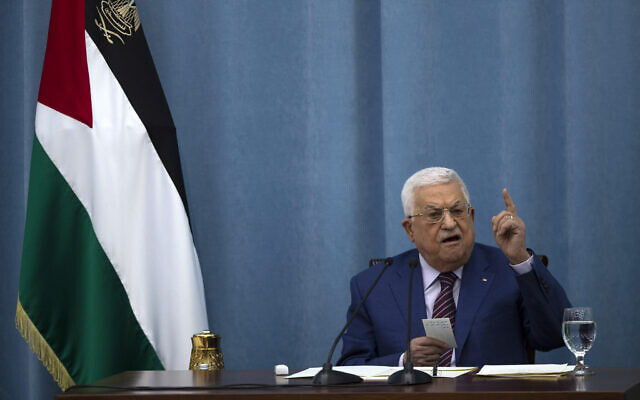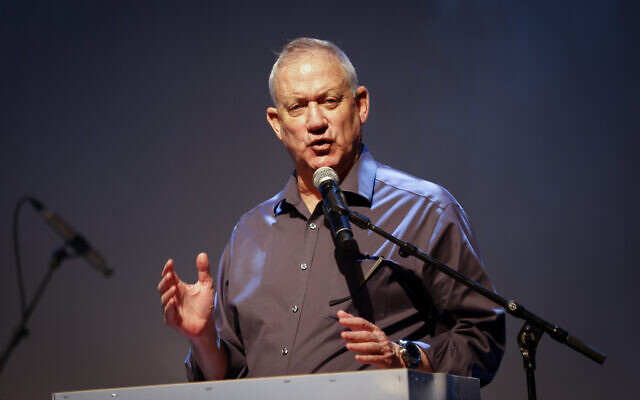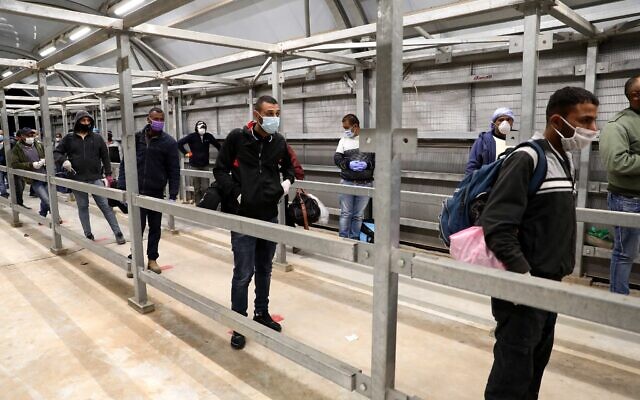Sit-down comes after Bennett returns from meeting Biden in Washington; Defense Minister says Israel is ready to boost Palestinian Authority’s ailing economy

Palestinian Authority President Mahmoud Abbas and Defense Minister Benny Gantz met in Ramallah on Sunday evening in the first such high-level face-to-face talks in over a decade, Israeli and Palestinian officials announced.
“President Mahmoud Abbas met this evening in Ramallah with Mr. Benny Gantz, where they discussed all aspects of Palestinian-Israeli relations,” tweeted senior Palestinian Authority official Hussein al-Sheikh, a close confidante of Abbas and Ramallah’s chief liaison to Israel.
A statement from Gantz’s office said the two discussed issues related to security, diplomacy, economics and civil affairs in wide-ranging talks.
“Gantz told [Abbas] that Israel is ready for a series of measures that would strengthen the PA economy,” the statement said.
“The two also discussed shaping the security, civilian and economic reality in Judea, Samaria and Gaza,” it added, referring to the West Bank by its Biblical names.
The meeting comes as Prime Minister Naftali Bennett returned from Washington after meeting with US President Joe Biden, where Biden raised the Palestinian issue with the new Israeli leader.
Bennett has vowed to prop up the ailing PA government and economy, although he has ruled out working to establishing an independent Palestinian state.
The last high-level face-to-face talks between Israeli and Palestinian leaders were in 2010, at the beginning of former prime minister Benjamin Netanyahu’s second term in office. While the two leaders crossed paths on occasion later, ties became increasingly strained as the peace process went on indefinite hold; their last public phone call was in 2017 after a Palestinian terror attack.
In recent years, high-level contact between the two sides became scarce.

According to Gantz’s office, the politicians held two rounds of discussions. The first was attended by Israel’s military liaison to the Palestinians, Ghassan Alian, Palestinian Authority intelligence chief Majid Faraj and al-Sheikh. In the second, Gantz and Abbas spoke privately.
During Biden’s meeting with Bennett, the president underscored “the importance of steps to improve the lives of Palestinians and support greater economic opportunities for them” and noted “the importance of refraining from actions that could exacerbate tensions, contribute to a sense of unfairness, and undermine efforts to build trust,” the White House said.
Gantz spoke on the phone with Abbas in mid-July, marking the highest-level public contact between the two sides since Netanyahu’s 2017 phone call. A flurry of meetings and phone calls have followed: Public Security Minister Omar Barlev spoke with Abbas a few weeks later, while ministers on both sides held rare meetings with their counterparts.
Israeli officials have publicly emphasized strengthening the PA’s economy, as Ramallah faces a growing fiscal crisis. In July, Israel increased the number of work permits for West Bank Palestinians seeking employment inside Israel in an attempt to ease the economic pangs.

The West Bank economy has been battered by the coronavirus, shrinking by 11.5 percent over the course of 2020. The PA government budget has also taken a serious hit, with a Western diplomat warning The Times of Israel in late July that the PA was “about to collapse due to lack of revenues.”
At the same time, Ramallah has seen a major drop in Arab and international aid, which previously accounted for a significant chunk of its budget. In 2019, the PA received around $300 million in budget support by the end of June. In 2021, however, they got just $30.2 million — barely more than one-tenth the amount.
The majority of the budget is derived from tax revenues Israel collects on its behalf, known as clearance revenues.
Under a 2018 Israeli law, Israel regularly confiscates money from the revenues to penalize Ramallah for its policy of paying stipends to Palestinian security prisoners, those killed during violent confrontations with Israeli forces, and their families — including those who committed terror attacks against Israelis.
In July, the Israeli government signed off on the confiscation of 600 million NIS ($186 million) over the course of six months. The figure was said to be approximately the same as what Ramallah pays out in salaries to terror convicts and families of so-called martyrs in 2020.
The Times of Israel reported on Friday that Israel and the Palestinian Authority have been conducting talks for a financial aid plan that could see hundreds of millions of shekels sent to Ramallah. A finalized deal, however, has yet to be publicly announced.
As reported by The Times of Israel
